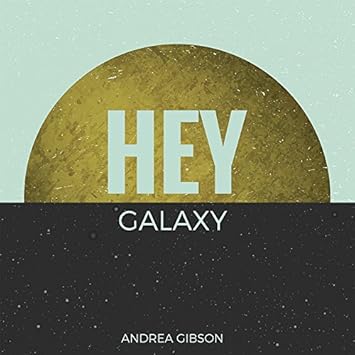
I didn’t really like Andrea Gibson’s Hey Galaxy on first listen, because it didn’t seem like an album that was meant for me. Gibson is one of the most famous performance poets in the world, and they’ve written a number of books and albums that are leagues more popular than other spoken word artists. Gibson tackles a number of women’s and queer issues in their work, which is why it hadn’t really impacted me, but upon listening to this album again and again, I realized that this is an album that is just as much to inform cis, straight men as it is to give voice to the community Gibson comes from.
Spoken word albums are incredibly difficult to pull off. They don’t have the sort of constant replay value, so the poet needs to make a big impact from the get-go. Most poets that try to force replay value[i] tend to intersperse their poetry with songs or layer their poems over songs, but Gibson mostly shies away from this, save for “Radio[ii].” The instrumentals act the way you’d expect them to, nice flourishes to occupy the silence behind the poet’s voice. I’m mostly drawn to the final two live tracks, as it brings about the feelings of being at a live poetry slam, hearing the crowd cheer along. These are also poems that embrace humor to teach a little more.
Gibson has a number of relatable poems like “Ode to the Public Panic Attack” or “Boomerang Valentine.” The latter is an endearing sometimes funny journey to self-love: “What if you are the love of your life/I think, ‘Oh my god, I hope not, because I am absolutely not my type.” Gibson paints pictures of their partner and sister on “Give Her” and “Photoshopping My Sister’s Mugshot:” the first a sweet love poem, the latter an emotional remembrance. Gibson has the ability to convey everything to the listener, where you can fill in the gaps with your own experiences here. Anyone who’s been in love or felt worry can sit themselves in Gibson’s shoes in these poems.
I can’t help but be drawn to the emotive “Letter to White Queers,” because there is no instrumental track. It forces the listener to really take on the impact of the words, which was definitely Gibson’s intent. It was the impactful moment that made me rethink my initial response to the album. “Orlando” is an excellent ode to those lost in the Pulse Nightclub Shooting. Gibson discusses their reaction to the attack on the community they belong to and how terrifying it was for her to perform the next day. Gibson also takes the chance to open up to show the wider picture that the attack wasn’t an isolated incident. They show how there is often persecution of the LGBTQ community, and they plead for more sense of safety. “Letter” is a tasteful comparison to the struggles of the LGBTQ community to those of the African American community. Gibson uses the silence of the backing track to give a voice to the communities that have traditionally been silenced. They have seen hate crimes against the queer community and knows that it’s a product of a similar system that has caused hate crimes against the black community. Unlike “Public Panic Attack” or “Give Her” or “My Sister’s Mugshot,” this is meant to give voice to her community, but I still think I’m an audience they’re trying to reach. It’s not a poem that’s there for me to relate to; it’s a poem for me to listen to and think about.
Gibson’s community will surely take solace in a number of their poems and maybe even have a few laughs here and there, but Gibson’s work is most effective in teaching, and that’s why I loved this album.
[i] See TWIABP and Hotel Books
[ii] Even here, the sung part by Jesse Thomas mainly serves as an intro.